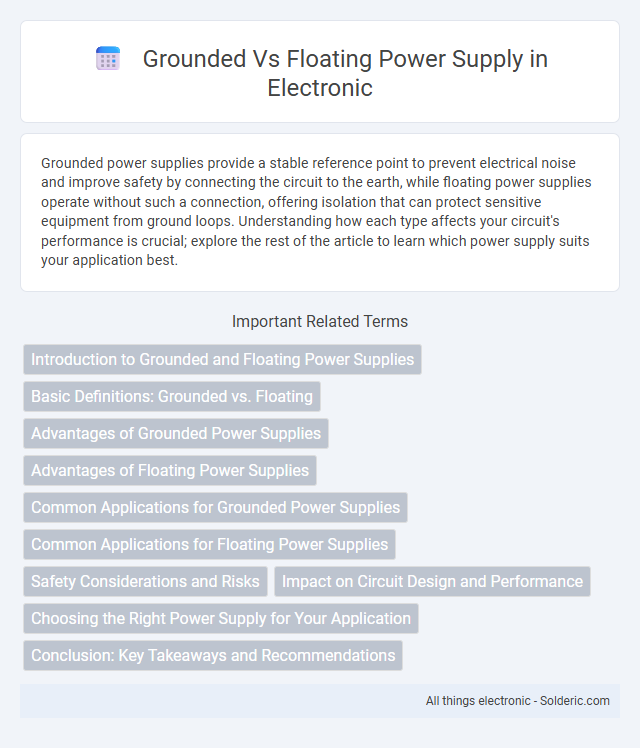Grounded power supplies provide a stable reference point to prevent electrical noise and improve safety by connecting the circuit to the earth, while floating power supplies operate without such a connection, offering isolation that can protect sensitive equipment from ground loops. Understanding how each type affects your circuit's performance is crucial; explore the rest of the article to learn which power supply suits your application best.
Comparison Table
| Feature | Grounded Power Supply | Floating Power Supply |
|---|---|---|
| Definition | Power supply with one terminal connected to earth ground. | Power supply with isolated terminals, no direct earth ground connection. |
| Safety | Higher safety due to direct grounding, reduces shock risk. | Lower shock risk in some cases but can cause unexpected voltage floats. |
| Noise Immunity | Better noise suppression due to stable ground reference. | Can be prone to noise and interference without stable reference. |
| Applications | Common in general electronics, industrial equipment. | Used in sensitive measurements, isolation testing, battery-operated devices. |
| Fault Detection | Easier to detect ground faults. | Harder to detect faults due to isolation. |
| Cost | Generally lower cost due to simpler design. | Higher cost for isolation and safety components. |
Introduction to Grounded and Floating Power Supplies
Grounded power supplies have their output connected to a common earth ground, ensuring safety and minimizing electrical noise in sensitive electronic circuits. Floating power supplies, on the other hand, have no direct connection to earth ground, allowing them to provide isolation and prevent ground loops in measurement and testing applications. Understanding the distinction between grounded and floating power supplies is crucial for effectively designing electrical systems that require precise voltage control and noise reduction.
Basic Definitions: Grounded vs. Floating
A grounded power supply has a direct connection to the earth, ensuring a stable reference point and enhanced safety by preventing voltage buildup. A floating power supply, on the other hand, is isolated from the earth ground, allowing it to operate without a fixed reference potential, which is useful in specific testing and medical applications. Understanding these basic definitions is essential for selecting the appropriate power supply type for electrical systems and devices.
Advantages of Grounded Power Supplies
Grounded power supplies offer enhanced safety by providing a clear path for electrical faults, reducing the risk of electric shock and equipment damage. They ensure stable voltage levels and minimize electrical noise, which improves the performance and reliability of sensitive electronic devices. Your systems benefit from better protection against surges and short circuits, making grounded power supplies ideal for critical applications.
Advantages of Floating Power Supplies
Floating power supplies offer enhanced safety by isolating electrical circuits from the ground, reducing the risk of electric shock and minimizing ground loop interference in sensitive electronic equipment. They enable more flexible wiring configurations and are ideal for applications requiring isolation, such as medical devices and precision measurement systems. Improved noise immunity and reduced signal distortions further contribute to their reliability and performance in complex electrical environments.
Common Applications for Grounded Power Supplies
Grounded power supplies are commonly used in industrial machinery, medical equipment, and laboratory instruments where safety and noise reduction are critical. These power supplies provide a stable reference point by connecting to earth ground, minimizing electrical interference and preventing unwanted voltage build-ups that can damage sensitive components. Grounded power systems are essential in environments requiring strict adherence to electrical safety standards and precise operational reliability.
Common Applications for Floating Power Supplies
Floating power supplies are commonly used in sensitive measurement equipment and medical devices where isolation from ground prevents ground loops and noise interference. Your instrumentation and communication systems benefit from floating supplies by ensuring signal integrity and safety. These power supplies are essential in applications like patient monitoring, precision sensors, and isolated data acquisition systems.
Safety Considerations and Risks
Grounded power supplies provide a direct connection to earth, significantly reducing the risk of electric shock and equipment damage by safely diverting fault currents. Floating power supplies lack this connection, increasing the potential for shock hazards and making it critical to implement additional insulation and protective measures. Proper grounding is essential in industrial and medical environments to comply with safety standards and prevent electrical accidents.
Impact on Circuit Design and Performance
Grounded power supplies provide a stable reference point, minimizing noise and improving signal integrity in sensitive circuits, which enhances overall performance. Floating power supplies isolate the circuit from ground, allowing greater flexibility in measurement and reducing ground loop interference but can introduce challenges in maintaining safety and consistent voltage levels. Your choice between grounded and floating power supplies significantly affects circuit design complexity, noise susceptibility, and system reliability.
Choosing the Right Power Supply for Your Application
Selecting the right power supply depends on the specific needs of your application, where grounded power supplies offer stable reference voltage and reduced noise interference, ideal for sensitive electronic circuits. Floating power supplies provide isolation from the ground, enhancing safety and flexibility in measurement instruments or testing environments where ground loops may cause issues. Consider factors like circuit design, safety requirements, and noise immunity to determine which power supply best fits your operational demands.
Conclusion: Key Takeaways and Recommendations
Grounded power supplies enhance safety by providing a direct path to earth, reducing the risk of electrical shock and equipment damage. Floating power supplies offer isolation benefits, minimizing noise and interference in sensitive electronic circuits but may require careful handling to prevent hazards. Consider your specific application's safety requirements and noise sensitivity to determine whether a grounded or floating power supply best supports your system's performance and protection needs.
Grounded vs Floating Power Supply Infographic

 solderic.com
solderic.com